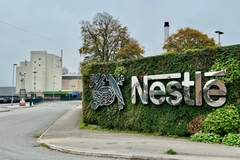
- Industry news
Industry news
- Category news
Category news
- Reports
- Key trends
- Multimedia
- Journal
- Events
- Suppliers
- Home
- Industry news
Industry news
- Category news
Category news
- Reports
- Key trends
- Multimedia
- Events
- Suppliers
SABMiller Delivers Strong Performance in Challenging Conditions

The group delivered a strong performance despite difficult economic and operating conditions which began to moderate in some of our developing markets in the final quarter of the year.

20 May 2010 --- SABMiller plc, one of the world's leading brewers with operations and distribution agreements across six continents, reports its preliminary (unaudited) results for the twelve months to 31 March 2010.
Operational Highlights
* Lager volumes of 213 million hectolitres (hl), in line with the prior year on an organic basis; share gains in many markets
* Group revenue up 4% and EBITA up 6% with margin growth of 30 basis points (bps) driven by robust pricing and cost efficiencies
* EBITA1 increases in all regions except Asia:
o Latin America delivers strong EBITA1 growth of 17% through pricing and cost productivity
o Solid pricing and cost management in Europe drive EBITA1 growth of 4% despite lower volumes
o Cost synergies deliver EBITA1 growth of 7% in North America
o Resilient lager volume growth in Africa underpins EBITA1 growth of 4%
o Asia EBITA1 level as strong China growth is offset by constraints in India
o South Africa Beverages EBITA1 grows 2% despite increased market investment
* Adjusted EPS up 17% with operating performance enhanced by lower finance costs and a reduced tax rate
* Strong free cash flow2 of US$2,010 million, with dividends per share up 17%
Meyer Kahn, Chairman of SABMiller, said:
"In a year characterised by very difficult trading conditions, the business has delivered another strong performance, capitalising on our excellent market positions and unique portfolios of leading local and international brands. Profits and cash flow have improved significantly, and at the same time, we have continued to support current and future growth opportunities, particularly in our developing market businesses.”
Business review
The group delivered a strong performance despite difficult economic and operating conditions which began to moderate in some of our developing markets in the final quarter of the year. Total beverage volumes of 261 million hl were in line with the prior year on an organic basis, with lager volumes level and soft drinks volumes up 2%. Sales were supported by share gains in many markets, and group revenue grew 4% driven by price increases taken principally in the prior year and selectively in the current year.
On an organic, constant currency basis, EBITA grew by 6% with margin up by 30 bps on the prior year to 16.7%. Raw material costs were marginally higher than the prior year, with cost increases moderating during the second half. Brewing raw material costs began to trend lower later in the year, although packaging and sugar costs continued to rise. Focus was maintained on cost management and productivity, with synergies and cost restructuring benefits offsetting increases in depreciation, paycost inflation and, in some markets, increased investment in brand and retail execution. EBITA also grew 6% on a reported basis, with the significant adverse currency impact in the first half offset in the second half as our major operating currencies appreciated against the US dollar.
Adjusted earnings were 22% ahead of the prior year reflecting EBITA growth, lower finance costs, a lower effective tax rate and reduced profit attributable to minorities. The minority share of profit declined principally as a result of our purchase of the 28.1% minority interest in our Polish subsidiary Kompania Piwowarska in May 2009, in exchange for the issue of 60 million ordinary shares. The group's effective tax rate for the year was 28.5%, 170 bps lower than the prior year. Adjusted earnings per share were up 17% to 161.1 US cents.
The group generated free cash flow of US$2,010 million, an improvement of US$1,913 million compared with the prior year. Significant improvements were made in working capital management, with a considerable contribution from the business capability programme initiatives announced earlier in the year. Cash inflow from working capital was US$563 million, compared with an outflow of US$493 million in the prior year. Capital expenditure including the purchase of intangible assets was US$1,528 million, US$619 million lower than the prior year reflecting the completion of several major projects.
Net debt decreased by US$311 million to US$8,398 million, reflecting the strong cash flow but partly offset by adverse currency translation. The group's gearing ratio fell to 41% from 54% in the prior year. The Board has recommended a final dividend of 51 US cents per share, which will be paid to shareholders on 13 August 2010. This brings the total dividend per share to 68 US cents, an increase of 10 US cents (17%) over the prior year.
* Latin America delivered very strong EBITA growth of 18% on a reported basis and 17% on an organic, constant currency basis through the combination of volume growth, pricing and mix benefits, lower raw material costs and fixed cost productivity. Despite challenging trading conditions for much of the year, lager volumes grew 3%, supported by good growth in the final quarter as economies showed signs of improvement. During the year we achieved further share gains. In Colombia, lager volumes grew 3% during the year with robust growth during the second half supported by strong market execution and a strengthening economy. This was achieved notwithstanding a price increase to recover higher beer sales taxes implemented in February 2010. In Peru, lager volumes were in line with the prior year reflecting a return to growth in the second half of the year due to improving economic conditions and ongoing market share gains.
* Europe's lager volumes declined 5% on an organic basis, as beer markets across the region contracted under severe economic conditions compounded by significant excise increases in some key markets. Against this backdrop, we gained market share in Poland and Romania and held share in the Czech Republic and Russia. Despite the volume decline, robust pricing taken predominantly in the prior year, combined with cost efficiencies, supported constant currency EBITA growth of 4% on an organic basis. Reported EBITA declined 8% reflecting a significant weakening of central European currencies against the US dollar.
* North America delivered EBITA growth of 7% for the year on a reported basis compared to the previous year which included one quarter of Miller Brewing Company operations prior to the formation of the MillerCoors joint venture. MillerCoors delivered pro forma1 EBITA growth of 13% despite a sluggish US beer market impacted by continued adverse economic conditions. On a pro forma basis, MillerCoors domestic sales to wholesalers (STWs) and sales to retailers (STRs) for the year were both down 2%. EBITA growth was driven by favourable pricing, incremental synergy benefits and marketing and fixed cost savings, partly offset by lower volumes and commodity cost pressures. During the year, incremental synergy and cost savings of US$281 million were delivered resulting in total annualised synergy and cost savings of US$409 million. MillerCoors remains on track to deliver US$750 million in total annualised synergies and other cost savings by the end of the calendar year 2012.
* In Africa, our beer markets were broadly resilient, with the majority continuing to grow through the year albeit at a slower rate than in recent years. Lager volumes grew 6% with Mozambique, Zambia and Uganda delivering strong growth supported by improved geographical coverage following new brewery investments, excise reductions and capacity expansion respectively. Botswana's lager volumes were severely impacted by the social levy on alcohol introduced in November 2008, while volumes in Tanzania fell in line with a market affected by unseasonable weather earlier in the year. Soft drinks volumes grew 4% organically for the year. We continued to grow our beverage platforms with the acquisition of water businesses in Ethiopia and Uganda and of a maheu business, a non-alcoholic traditional beverage, in Zambia. During the year, we invested in new breweries in Angola, Mozambique, Southern Sudan and Tanzania and upgraded capacity in Uganda and Zambia. Currency weakness held back reported EBITA growth to 1% while constant currency EBITA grew 4% on an organic basis underpinned by volume growth and beneficial mix impact from the introduction of local premium lager brands.
* In Asia, lager volumes increased organically by 7% with growth of 10% in China. China benefited from further share gains by the Snow brand supported by the launch of the new premium variant, Snow Draft. India's volumes fell 14% with some market share loss due to regulatory issues and increased taxes across certain states, although conditions improved towards the end of the year. In Australia, the portfolio of premium brands continued to deliver strong growth with lager volumes up 32%. Organic, constant currency EBITA was level, with good growth in China offset by the impact of India's volume decline. Reported EBITA, which includes initial losses in recent Chinese acquisitions, fell 12%.
* In South Africa, lager volumes were 1% below the prior year in a market that grew marginally. The market was buoyed by the inclusion of two Easter buy-in periods within the financial year although consumer spending remained generally subdued. Our lager sales benefited from refreshed positioning and communication for our core brands, together with increased investment in sales capability and customer service. Soft drinks volumes declined 1% during the year due to the weak economic environment and unfavourable weather conditions during the peak summer trading period. Organic, constant currency EBITA grew 2% although margin declined slightly as pricing benefits and fixed cost productivity were eroded by higher input costs and intensified marketing spend. On a reported basis, EBITA grew 16% benefiting from the strength of the rand relative to the US dollar over the year. The broad based black economic empowerment transaction that was announced on 1 July 2009 will be completed in June 2010. The deal will benefit employees, soft drinks and liquor retailers and the wider South Africa community by placing 8.45% of the equity of The South African Breweries Limited under black ownership.
* As announced previously, the group has embarked on a major business capability programme to simplify processes and reduce costs, enabling local management to focus more on market-facing activities. Back office functions including finance, human resources and procurement will be streamlined through standard global information processes and applications, while front office processes including sales, distribution and supply chain management, will benefit from common regional platforms. The programme remains on track to be completed by 2014, delivering ongoing cost benefits of US$300 million per annum by 2014. In the current financial year, we have realised substantial working capital benefits of US$333 million while recognising exceptional costs of $342 million relating to the programme. In addition, exceptional charges of US$165 million were taken in respect of other projects, predominantly to raise efficiency through brewery restructuring in Europe and Colombia (US$123 million) and the integration of MillerCoors (US$18 million).









